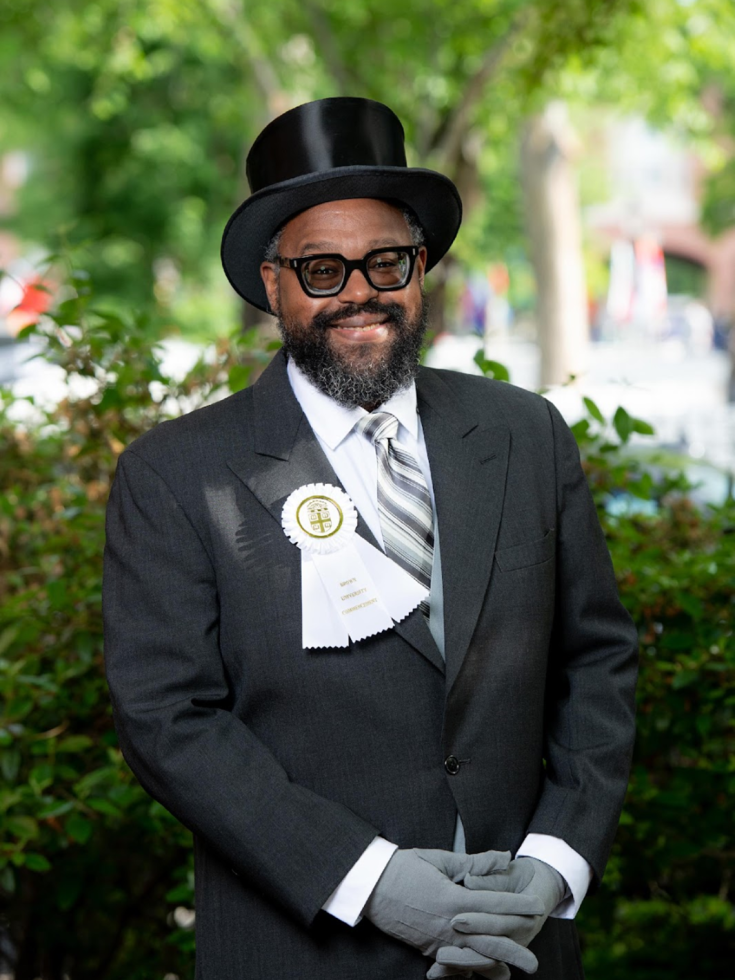Why is supporting Brown important to you?
“Supporting Brown feels more important now than ever with all the challenges facing higher education. Brown remains a vital place committed to advancing knowledge, serving communities, and educating future generations. In today's world, Brown's Open Curriculum truly champions independent thinking and diverse viewpoints. This is exactly what we need to tackle everything from societal issues to critical areas like public health and cutting-edge research.
These are the students who'll be equipped to solve global problems and drive innovation. Our support ensures Brown stays a haven for free thought, fearless inquiry, and diverse experiences, continuing to shape leaders who contribute to the greater good and drive essential discoveries.”
Which areas at Brown do you give to, and what inspires you to make those choices?
“My wife—who's also a proud Brown alum—and I direct our giving towards areas that are deeply important to us. These include financial aid, especially the IPC Brown Annual Fund (BAF) Scholarship, the School of Public Health, and Brown's broader research efforts.
Supporting financial aid efforts like the IPC BAF Scholarship is incredibly important because it directly tackles the critical need for accessibility in higher education. We want to make sure that all exceptional students can access a Brown education. This is a fundamental step toward creating a truly representative and intellectually rich campus.
My contributions to the Public Health Annual Fund stem from my recognition of Brown's leading research and impactful community initiatives in this field. Brown's public health experts aren't just making discoveries; they're directly influencing policy and improving the health and well-being of communities worldwide.
I'm also incredibly inspired by Brown's extensive research capabilities across all fields. Brown's research enterprise is a powerhouse of discovery and innovation, directly impacting health, our economy, and even preserving American history. Contributing to funds like the Research Resilience and Innovation Fund ensures our faculty and students can continue to push the boundaries of knowledge and deliver breakthroughs that benefit all of society.”
What does philanthropy mean to you?
“When I give to Brown, it's a truly emotional experience—a mix of deep gratitude, pride, and hope.
My gratitude stems from the transformative education I received at Brown. It shaped my curiosity, broadened my perspectives, and gave me invaluable connections and friends who became like family. There's also gratitude for the chance to contribute to areas that have a direct, tangible impact on society and advance our collective understanding of the world.
There's a strong sense of pride in being part of a community that strives for progress, inclusivity, and academic excellence. Supporting the legacy and future of such an impactful institution fills me with immense satisfaction.
And finally, hope for the next generation of Brunonians and hope for the positive change that Brown's work can bring to the world.
For me, philanthropy isn't just about financial transactions; it's about actively participating in shaping the future. It's a tangible way to express my belief in the power of education and research to transform lives and communities. It’s about building on the legacy of those who came before us and ensuring that Brown continues to be a force for good—a place where all students can thrive, and where crucial advancements in fields like public health and scientific inquiry can continue without hindrance.”
What is your advice for a fellow alum considering making a gift to Brown?
“1. Connect with your passion: What aspect of your Brown experience or Brown's mission truly resonates with you? It could be the Open Curriculum, a specific department, financial aid, a sports team, the arts, public health, research. When you direct your giving to something you're passionate about, your contribution will feel much more meaningful.
2. Understand the impact: Take a moment to learn how your gift, no matter the size, can make a difference. Look for specific opportunities and understand the tangible results they produce.
3. Every gift matters: Even a modest gift adds to the incredible collective power of our alumni network. Your participation, your belief in Brown, and your commitment to its future are just as valuable as the dollar amount. The most important thing is to engage and contribute in a way that feels authentic and sustainable for you.
Ultimately, giving to Brown is an investment in the future—for the University, its students, and the positive impact they'll have on the world. It's about making sure that the transformative Brown experience remains accessible and vibrant, and that its vital contributions to cutting-edge research continue to thrive for generations to come.”
